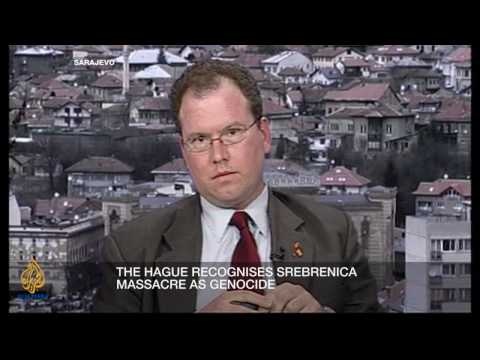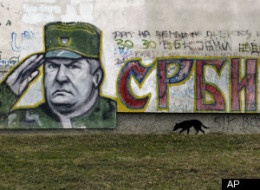


Mladic might have been on trial long ago had the rest of the EU shown the same resolve as the Netherlands in insisting on his arrest as a condition for progress towards membership.
Following Article is by Kurt Bassuener,(Photo Above) Senior Associate of the Democratization Policy Council. (Article also appeared in Balkan Insight). He lives in Sarajevo. Kurt and I have become internet contacts/friends exchanging perspectives on how to move Bosnia forward. Ambassador Muhamed Sacirbey
---
Bosnian Serb military commander Ratko Mladic’s arrest in the Vojvodina village of Lazarevo yesterday was a major boon for justice and an event many feared would never come after his 16 years on the run. It also comes in the nick of time for his trial. Had he been found little more than a year from now, he would not have been tried for genocide, war crimes, and crimes against humanity by the International Criminal Tribunal for the former Yugoslavia, the ICTY, but by the court’s “residual mechanism.”
Much of the factual knowledge accumulated over the ICTY’s course of operation would have been lost with the personnel who would have left. The overarching question many ask is, “Why now?”
It surely comes to a question of simple cost-benefit analysis for President Boris Tadic’s government in Serbia.
ICTY Prosecutor Serge Brammertz’s report on Serbia’s cooperation with the UN Security Council, to be delivered on June 6, was recently leaked to the media. It was decidedly negative, citing Serbia’s “comprehensively failing strategy” to locate and arrest the remaining fugitives – Mladic and Croatian Serb wartime leader Goran Hadzic.
The Dutch parliament’s EU Affairs Committee, other parliamentarians , and the Dutch government, were unambiguous in linking their decisions on Serbia’s SAA and later on candidacy to Brammertz’s assessment of Serbia’s cooperation with the ICTY.
With little room for maneuver and the potential that Ireland might join the Dutch in holding the line, the Serbian government faced an intolerably high risk to Serbia’s EU prospects.
President Tadic also calculated that the risk of angering those Serbians who still view Mladic as a hero was lower than the risk of going to an electorate with the prospects of EU candidacy stalled. Given the reported size of protests reported last night in Belgrade and Novi Sad, this seems to have been correct.
While the details continue to emerge, it is clear that Mladic was hardly under deep cover.
Ever since the US Senate’s linking of ICTY cooperation to Serbian assistance resulted in the arrest and transfer of Slobodan Milosevic in 2001, Serbia has had a history of doling out its ICTY indictees in installments to clear whatever conditionality hurdle that the international community has placed in its path.
Conditionality works, if you’re willing to uphold it. Mladic would probably have been already on trial had the full EU membership been aligned with the Dutch position.
Instead, many countries abandoned it over the past five years – Belgium being the last to make this shift.
Only the Irish parliament over the last eight months was a newcomer in looking at ICTY cooperation as a criteria for ratification of the Stability and Association Agreement and candidacy, with Fine Gael Deputy Sean Barrett (then foreign policy spokesman for the party in opposition, now Speaker for the party which governs after in the Dáil or Lower House since the March election) ) being the most vocal of a multiparty group of legislators.
The prospect of Ireland’s joining the Netherlands in making the Brammertz report the standard for deciding on SAA ratification (and later in the year, candidacy) was of sufficient concern for Serbian Foreign Minister Vuk Jeremic to appear before a parliamentary committee in January.
This surely would not have been on his itinerary otherwise. Legislators have long been at the forefront of insisting on conditionality, on both sides of the Atlantic, while executive branches have shown a tendency to want to smooth their bilateral relations with Serbia by sidestepping the issue whenever possible.
Serbia must be treated as a rational actor that will respond to incentives, not a basket case to be coddled and held to a lower standard.
Ever since the downfall of Slobodan Milosevic in October 2000 and the opening of Serbia’s prospects for Euro-Atlantic integration, successive governments in Belgrade have played on fears that insistence on arrest and transfer of scores of war crimes indictees would destabilize the democratic transition and bring radical nationalists to power.
This view found ready adherents in the EU and US State Department, which abandoned its own greatest leverage on ICTY cooperation with the surprise decision to abandon the linkage by admitting Serbia into the Partnership for Peace program at the Riga NATO Summit in December 2006.
This undercut a number of NATO allies – Britain and Denmark among them – who later abandoned their demands for full cooperation in the EU context. This policy effectively amounted to leverage in reverse, with Serbia demanding favourable policies as the price of good behaviour.
Serbian Foreign Minister Jeremic darkly threatened that Serbia could fall back into the nationalist abyss if it were not passed through into the EU, regardless of Serbia’s failure to find the remaining two fugitives.
Regrettably, a number of EU foreign ministries and the EU itself adopted his talking points as policy. Even the arrest of Mladic didn’t break that link with some. In his January 2011 Dublin testimony, Jeremic said the US was unable to find Osama Bin Laden, so why should Serbia be held to a higher standard? Yesterday, Swedish Foreign Minister Carl Bildt repeated the point in his reaction to the arrest on the BBC.
Serbia has proven it responds to rational incentives – and there is no reason to believe that this is not a reality across the party spectrum. So instead of bending over backwards to ensure Tadic and the Democratic Party’s re-election, the EU and wider West should instead insist that standards be met whoever is in power, and cut Serbia no more slack.
This is particularly important regarding Bosnia and Herzegovina, where Serbia has long played a double game of claiming to uphold the country’s sovereignty and territorial integrity while simultaneously backing the president of the Republika Srpska, Milorad Dodik, who has repeatedly questioned these essentials in his effort to unravel the state.
The idea seems to be that Belgrade is key to keeping Dodik in line. At the recent Bosnian-Serbian-Turkish presidential meeting in Karadjordjevo, Serbia made it clear that it preferred to spin its way out of choosing whether or not to support Dodik’s planned referendum on the state judiciary, stating that it wouldn’t support a referendum on the country’s territorial integrity.
It would appear that the Banja Luka tail can wag the Belgrade dog, reversing the assumed Serbian influence on Republika Srpska. Since good relations with all neighbours is an essential for EU candidacy and NATO membership, EU and NATO members should expect and insist on better from Serbia. Croatia’s former president Stipe Mesic, made this point directly on Monday.
"We have sent the Croats in Bosnia the message that your country is Bosnia-Herzegovina, your capital is Sarajevo and you create your policy there. We have not yet heard that message from Belgrade to Serbs in Bosnia.”
Demanding results from whoever is in power in Belgrade, and being willing to stand firm if they are not forthcoming, would entail a shift for the EU in particular, which has a habit of trumpeting declared progress as cover for lack of the real thing in the Western Balkans.
One of these results must remain the arrest and transfer of Goran Hadzic.
British Foreign Secretary William Hague tied it all together eloquently yesterday: “We’re also diplomatically very active in trying to make sure the Balkans don’t fly back. This was a conflict in the 1990s, but it doesn’t mean that the tensions are over,” he said.
“We’re very gravely concerned about the many tensions that exist in Bosnia today,” Hague added. “Europe, including the UK, have to face up to those [tensions], have to give clear leadership so that the Western Balkans don’t slide back, don’t slide back towards state failure, towards some of the problems that they had in the 1990s.”
Let’s hope Brussels gets the message.
By Kurt Bassuener is a Senior Associate of the Democratization Policy Council. He lives in Sarajevo.
---
Diplomatically Incorrect –
Become Fan on Facebook at “Bosnia TV” & “Diplomatically Incorrect”
Twitter Follow at DiplomaticallyX
More Reports at
diplomaticallyincorrect.org/c/bosnia
Including: "Dayton Accord Failures" -
diplomaticallyincorrect.org/films/movie/dayton-accord-failures/17917





